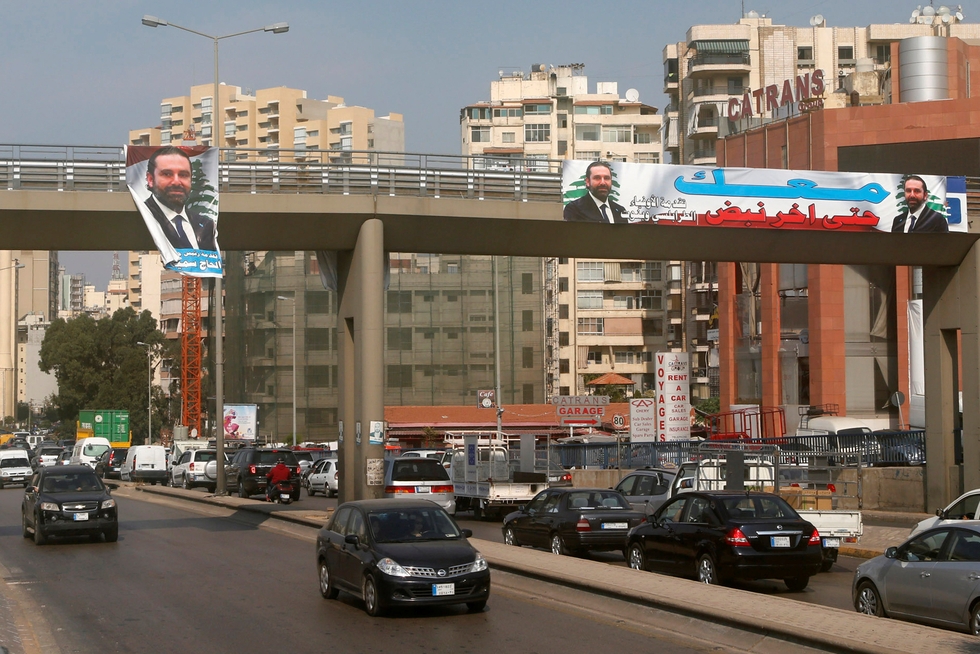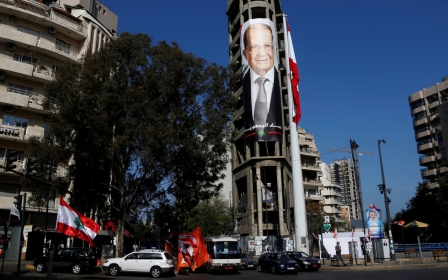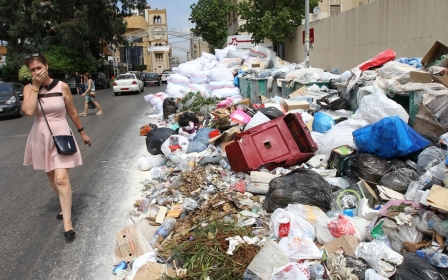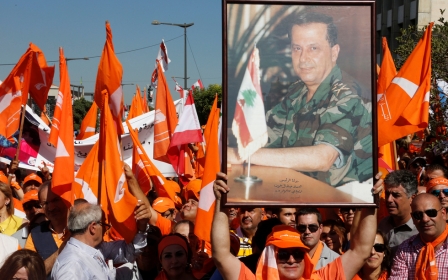As a new president rises, Lebanon’s Sunni bloc falls apart

It is now clear that Future Movement leader Saad Hariri's endorsement of former military general Michel Aoun as president - who was elected on Monday after a more-than-two-year stalemate - was the key to ending the presidential vacuum in Lebanon.
However, with the political decisions made by the powerful members of Lebanon's establishment not reflecting the political alliances to which they belong, Aoun's election also marks an entirely new political landscape in the country.
Hariri's endorsement not only contributed to his diminishing popularity among his supporters, but it was also widely condemned by MPs of his own political party, who refused to vote for Aoun. Other MPs refused to comment. More conservative allied Sunni political parties that were once left in the shadows of the Future Movement have stopped following the party line, refusing to vote for Aoun as well.
In return for his endorsement, it is likely that Hariri will get another stint as prime minister, but it will be at the expense of his leadership at the helm of what was once a nearly monopolised Sunni political bloc. New actors who subscribed to Hariri’s political party, or who were merely in the shadows as small-scale allies, are slowly but surely standing on their own two feet.
Hariri's rise and fall
In 2005, following the assassination of his iconic father, former prime minister and businessman Rafik Hariri, Saad Hariri took the reigns of the Future Movement political party and became the new de facto leader of the March 14 political alliance in Lebanon.
He was expected to continue fighting tooth and nail to bring those responsible for the assassination of his father to justice, and for Hezbollah to turn over their weapons to the state. The March 14 alliance took a hardline anti-Hezbollah/Iran/Syria stance, which contributed to existing sectarian tensions in Lebanon.
At the height of his political career, the vast majority of Sunni politicians in Lebanon rallied around the Future Movement as the monolithic moderate political entity, with several Islamist and Salafi organisations pragmatically allied to them, notably Al-Jama'a al-Islamiyya, Lebanon’s branch of the Muslim Brotherhood.
After an unsuccessful two-year stint as prime minister, Hariri began to slowly lose support among his supporters, as he slowly but surely took on a less hardline approach towards Hezbollah and other political parties from the March 8 alliance.
Through several key events and political developments since 2011, both in Lebanon and Syria, and also between the Middle East’s two powers, Saudi Arabia and Iran, hardliners within the Sunni block, notably former Internal Security Forces general and ex-justice minister Ashraf Rifi, and newly empowered Islamist and extremist organisations have slowly gained more prominence and support on their own.
Extremists no longer in the shadows
During the summer of 2012, Salafi preacher Sheikh Ahmad Assir’s intense Friday prayer sermons at the Bilal bin Rabah mosque in the southern city of Sidon started making headlines across in the country.
Many of the points he made did not stray away from Future Movement policy. He opposed Hezbollah’s armed wing, calling on them to return their weapons to the state, as well as condemned their support of the Assad regime in Syria against the opposition.
He also opposed Iran’s increasing influence in Lebanon. Of course, he fanned the sectarian flames of a disgruntled Sunni population who felt that Hariri was not protecting them as a sectarian leader in Lebanon ought to.
The Future Movement downplayed Assir’s influence, dismissing any affiliation with him and the impact he had had on the Sunni political constituency. If anything, it appears that Hariri and company hoped that a contained Assir as a visible alternative would frighten his unsatisfied moderate supporters and keep them quiet.
Assir eventually mobilised his supporters, many who would attend his sermons all the way from the northern city of Tripoli, to stage sit-ins and eventually sparking violent clashes. In late June 2013, supporters of Assir clashed with the Lebanese army and Hezbollah in Sidon, after sectarian tensions intensified, especially over what was happening in neighboring Syria.
While homegrown Sunni extremist groups were slowly but surely gaining more support among their constituency, especially among those in Sidon and Tripoli, one cannot exclude the impact of like-minded organisations on the battlefield next-door in Syria, notably the Fateh al-Sham Front (JFS), formerly the al-Qaeda affiliated Jabhat al-Nusra, and the Islamic State (IS) group. Both have a presence in Lebanon, but have been most noticeable and active in the northeast town of Arsal, not far from the Syrian border.
While IS and JFS were opponents on the battlefield in Syria, they were allies in Lebanon. In August 2014, they attacked a military checkpoint and stormed a police station in Arsal, taking soldiers and policemen hostage. After a fierce five-day battle with the Lebanese army, they retreated with the hostages.
It took 16 months for the Lebanese army to bring back the 16 hostages that JFS captured, including the executed soldier Muhammad Hamiyeh. It required Qatari mediation and the release of 13 prisoners, including the former of wife of Abu Bakr al-Baghdadi, the leader of IS. However, the seven hostages captured by IS haven’t been released yet, and it appears that the negotiation process has reached a stalemate.
Next Sunni strongman?
Rifi, the former justice minister, has been enjoying a soaring popularity. Known as a hardline supporter of the Future Movement, Rifi was always supported in his hometown of Tripoli, and was once even pushed by Hariri to be prime minister back in 2013.
However, like many other senior figures in the Future Movement, he, too, was losing patience with Hariri’s more pragmatic approach towards even his staunchest political adversaries, and was the most vocal in his disapproval within the party.
Rifi resigned from his position as justice minister in February, citing Hezbollah’s excessive influence on the Lebanese state. The turning point was the case of former minister Michel Samaha, who was released on bail in January after being arrested for smuggling explosives from Syria to Lebanon. Despite eventually being retried and sentenced to 10 years in prison, Rifi’s hardline position was set in stone. That said, he continued to dispel increasing rumours that he had quit the Future Movement.
Rifi’s rise ever since has been inevitable. During the Tripoli municipal elections last May, he enlisted a slate of his own supporters against a more mainstream slate that included the Future Movement, various Islamic parties, and even Sunni political rivals from the March 8 alliance, and won at least 18 of the 24 seats in Lebanon’s second-largest city.
To add insult to injury, he quit the Future Movement a month later, insisting that he was still a “fierce fighter in defence of political Harirism,” in reference to Saad Hariri’s late father.
The former justice minister’s reaction to Saad Hariri endorsing Aoun echoed the sentiments of most Future Movement supporters, slamming Hariri for selling Lebanon to “the Iranian project”.
Endless possibilities
The fragmentation of the Sunni bloc is more apparent than ever. With the Future Movement losing a political stronghold in Tripoli, they will do all they can to maintain the support they have left in Beirut and Sidon.
With parliamentary elections expected to take place in 2017, after years of MPs extending their terms, the possibilities are endless when it comes to how Rifi and more conservative Islamist parties will try to win support. They could perhaps run together the way the Future Movement did with them in the past.
There’s also the question about whether Rifi will settle at his victory in Tripoli, or whether he will try to penetrate Beirut as well.
Time will only tell as Lebanon enters an interesting new political era.
- Kareem Chehayeb is a Lebanese writer and musician based in Beirut. He is the co-founder of Beirut Syndrome, a grassroots media platform. You can follow him on Twitter @chehayebk
The views expressed in this article belong to the author and do not necessarily reflect the editorial policy of Middle East Eye.
Photo: Banners showing pictures for Lebanon's former prime minister Saad al-Hariri are hung on a pedestrian bridge in Beirut (Reuters)
New MEE newsletter: Jerusalem Dispatch
Sign up to get the latest insights and analysis on Israel-Palestine, alongside Turkey Unpacked and other MEE newsletters
Middle East Eye delivers independent and unrivalled coverage and analysis of the Middle East, North Africa and beyond. To learn more about republishing this content and the associated fees, please fill out this form. More about MEE can be found here.





